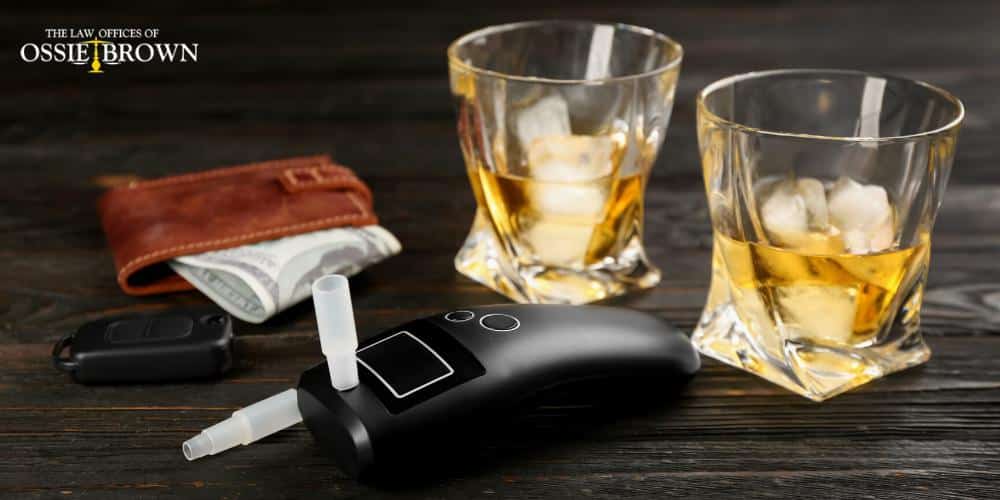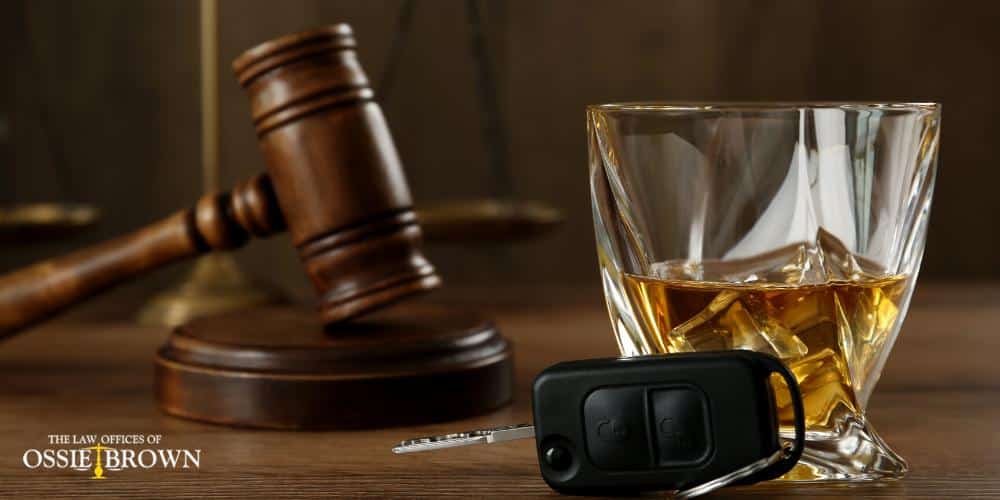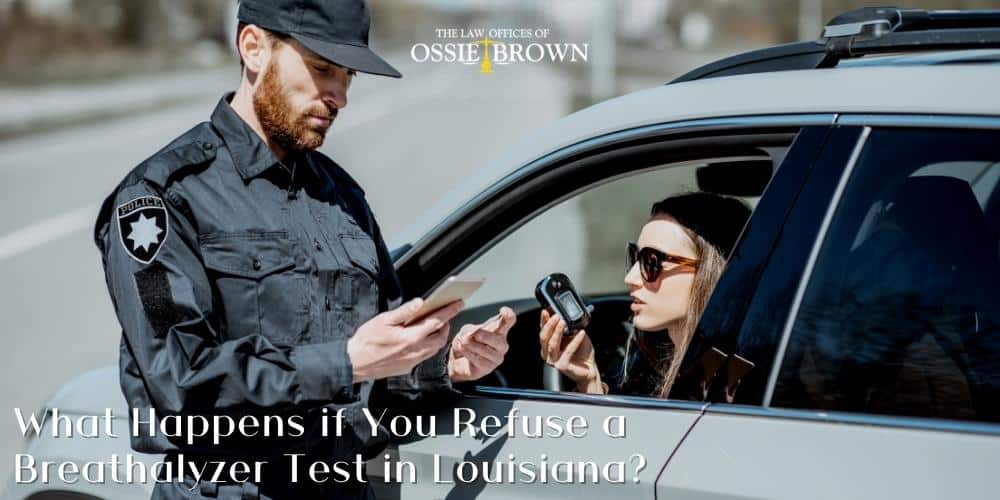When people get pulled over for drunk driving, they generally have to undergo a field sobriety test and provide a breath sample via a breathalyzer test. If the driver fails these tests, they can face DUI charges and convictions. In order to avoid the consequences of driving under the influence of drugs or alcohol, some intoxicated drivers will refuse a breathalyzer test altogether. Technically, drunk drivers do have the legal right to do this, but that doesn’t mean they won’t face serious penalties. So – what happens if you refuse a breathalyzer test under Louisiana drunk driving laws? You could get your driver’s license suspended and even face jail time or fines. If you refuse a breathalyzer enough times, you could face a separate criminal offense from a DUI. Baton Rouge DUI lawyers at the Law Offices of Ossie Brown explain all this and more below.
If you’re facing a DUI charge or conviction, call our law firm at 225-343-1111 to schedule a free consultation today.
BAC Legal Limit in Louisiana
The blood alcohol concentration (BAC) legal limit is 0.08% according to Louisiana state laws (RS 14:98). If you are caught driving under the influence of drugs or alcohol, and you have a BAC of at least 0.08%, you could face a DUI arrest and/or conviction.
We provide more information here: Can you get a DUI for driving high?
What is a Breathalyzer Test?
A breathalyzer test – also known as an alcohol breath test – is a chemical test that’s most commonly used by law enforcement officers during field sobriety tests. The device measures a driver’s blood alcohol content within seconds. The results of breath testing can be used as solid evidence in court.
This is how a breath test works: a drunk driver will breathe into the mouthpiece connected to the device. The breath will enter a chamber that has an orange-colored solution in it – called potassium dichromate. If the person had been drinking, the alcohol in the breath will react with the orange-colored solution and turn it green. An electrical current is created from the color change, which converts into a numerical value. This value is the BAC level.
What To Expect When You Get Pulled Over for Drunk Driving
Before we get into whether or not you can refuse to take a breathalyzer test, it’s important to know what generally happens when a police officer stops someone for drunk driving.
Reasonable Cause to Stop
Most police officers will pull someone over if they see them swerving or committing some kind of traffic offense. That’s because these are classic signs of impairment. Signs of impairment give the police officer reasonable grounds (AKA: reasonable cause) to make a traffic stop.
Signs of Intoxication
Once stopped, the officer will look for obvious signs that the driver is driving under the influence of alcohol or drugs. Signs that someone is impaired are slurring, the smell of alcohol on the breath, fumbling around with keys, moving slowly, etc.
Questioning
Then, the officer may ask if the driver has been drinking. Most drunk drivers will outright deny it or give an underestimation of how much they drank.
Field Sobriety Tests
Next, the officer may conduct a field sobriety test and ask the driver to take a breathalyzer test. Field sobriety tests vary state to state, but here is an example of what an officer may ask a drunk driver to do to determine their level of intoxication:
- Horizontal Gaze Nystagmus (HGN): This is a medical term that describes the involuntary jerking of the eyeballs. This jerking of the eyes becomes noticeable when someone is under the influence of alcohol and/or drugs. In order to determine HGN, an officer will likely ask the driver to follow their finger with their eyes while keeping the head still. If they eyes “jerk” while following the finger, instead of gliding smoothly, then this can be a sign that the driver is drunk.
- Walk and Turn: This test determines someone’s level of divided attention. A police officer will ask the driver to take 9 steps, heel to toe, in a straight line. On the ninth step, the driver must turn around on one foot and take 9 steps back to where they started. If the driver struggles to maintain balance, keep track of the number of steps, or fails to touch heel to toe, they may be intoxicated.
- One Leg Stand: This is another common field sobriety test, where the officer will ask the driver to hold their foot about 6 inches off the ground while looking at their foot and counting in one thousands (one thousand one, one thousand two, etc.) If the driver struggles to count or keep their balance, they may be intoxicated.
The National Highway Traffic Safety Administration (NHTSA) believes that these 3 field sobriety tests are the best indicators of whether someone’s BAC is over 0.01%.
Breathalyzer Test
Next, the officer will likely run chemical testing via a breathalyzer. If the breathalyzer shows that a driver has a BAC of at least 0.08% and the driver failed one or more of the field sobriety tests, the officer may follow through with a DUI arrest. Drunk drivers may also have to undergo a urine or blood test, because breath tests can be unreliable.

What is Implied Consent?
Now back to the question at hand: what happens if you refuse a breathalyzer test in Louisiana?
The answer lies in implied consent laws, which all 50 states abide by. When you pass a driving test, you are allowed driving privileges, but only if you sign documents laying out the rules of your state. These rules include implied consent. Basically, this means that by signing the documents, the state has your implied consent to run field sobriety tests and/or breath testing if you’re ever caught drinking and driving. Implied consent laws also include carrying a driver’s license and proof of insurance with you and showing them to law enforcement officers when asked.
There are serious consequences of refusing a breathalyzer test in every state. Penalties can include:
- Driver’s license suspension for up to a year for the first refusal, up to 2 years for the second and subsequent refusals within 10 years
- Arrest
- Up to $1,000 in fines and up to 6 months of jail time if there have been 2 prior breathalyzer refusals and/or serious bodily injury/death caused by the drunk driving
As long as the drunk driving incident didn’t result in major injury or death of another driver, the driver can request a hardship license in Louisiana (AKA: a restricted license) only after installing an ignition interlock device (IID). An IID is basically a breathalyzer test that’s built into the car. A driver cannot start their car unless they breathe into the device and receive a sober BAC result.
What is “No Refusal” Enforcement?
Unfortunately, implied consent laws are not enough to deter drunk drivers from refusing a breathalyzer test. As a result, a handful of states – including Louisiana – have also implemented “no refusal” laws. This basically means if you are refusing to submit to a breathalyzer test, law enforcement can acquire a search warrant against you in order to obtain a blood test and determine the driver’s level of sobriety.
The problem with this law (and probably the main reason why not every state abides by this law) is that acquiring search warrants can take some time. If the process is slow, the driver may be sober by the time they get a blood test.

Call Baton Rouge DUI Lawyers at The Law Offices of Ossie Brown Today
If you have been arrested and/or convicted for driving under the influence of drugs or alcohol in Louisiana, you need to protect your rights by seeking legal counsel. Baton Rouge DUI lawyers at The Law Offices of Ossie Brown can help you obtain the best case outcome possible. Our Baton Rouge expungement lawyers can even help you possibly expunge a DUI from your criminal record. Call 225-343-1111 to schedule a free consultation with our legal team today.


